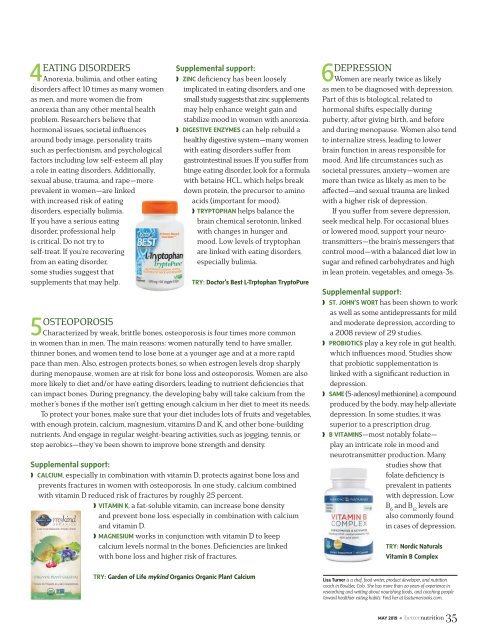Better Nutrition May 2019
You also want an ePaper? Increase the reach of your titles
YUMPU automatically turns print PDFs into web optimized ePapers that Google loves.
EATING DISORDERS<br />
4Anorexia, bulimia, and other eating<br />
disorders affect 10 times as many women<br />
as men, and more women die from<br />
anorexia than any other mental health<br />
problem. Researchers believe that<br />
hormonal issues, societal influences<br />
around body image, personality traits<br />
such as perfectionism, and psychological<br />
factors including low self-esteem all play<br />
a role in eating disorders. Additionally,<br />
sexual abuse, trauma, and rape—more<br />
prevalent in women—are linked<br />
with increased risk of eating<br />
disorders, especially bulimia.<br />
If you have a serious eating<br />
disorder, professional help<br />
is critical. Do not try to<br />
self-treat. If you’re recovering<br />
from an eating disorder,<br />
some studies suggest that<br />
supplements that may help.<br />
Supplemental support:<br />
ZINC deficiency has been loosely<br />
implicated in eating disorders, and one<br />
small study suggests that zinc supplements<br />
may help enhance weight gain and<br />
stabilize mood in women with anorexia.<br />
DIGESTIVE ENZYMES can help rebuild a<br />
healthy digestive system—many women<br />
with eating disorders suffer from<br />
gastrointestinal issues. If you suffer from<br />
binge eating disorder, look for a formula<br />
with betaine HCL, which helps break<br />
down protein, the precursor to amino<br />
acids (important for mood).<br />
TRYPTOPHAN helps balance the<br />
brain chemical serotonin, linked<br />
with changes in hunger and<br />
mood. Low levels of tryptophan<br />
are linked with eating disorders,<br />
especially bulimia.<br />
TRY: Doctor’s Best L-Trptophan TryptoPure<br />
5 OSTEOPOROSIS<br />
Characterized by weak, brittle bones, osteoporosis is four times more common<br />
in women than in men. The main reasons: women naturally tend to have smaller,<br />
thinner bones, and women tend to lose bone at a younger age and at a more rapid<br />
pace than men. Also, estrogen protects bones, so when estrogen levels drop sharply<br />
during menopause, women are at risk for bone loss and osteoporosis. Women are also<br />
more likely to diet and/or have eating disorders, leading to nutrient deficiencies that<br />
can impact bones. During pregnancy, the developing baby will take calcium from the<br />
mother’s bones if the mother isn’t getting enough calcium in her diet to meet its needs.<br />
To protect your bones, make sure that your diet includes lots of fruits and vegetables,<br />
with enough protein, calcium, magnesium, vitamins D and K, and other bone-building<br />
nutrients. And engage in regular weight-bearing activities, such as jogging, tennis, or<br />
step aerobics—they’ve been shown to improve bone strength and density.<br />
Supplemental support:<br />
CALCIUM, especially in combination with vitamin D, protects against bone loss and<br />
prevents fractures in women with osteoporosis. In one study, calcium combined<br />
with vitamin D reduced risk of fractures by roughly 25 percent.<br />
VITAMIN K, a fat-soluble vitamin, can increase bone density<br />
and prevent bone loss, especially in combination with calcium<br />
and vitamin D.<br />
MAGNESIUM works in conjunction with vitamin D to keep<br />
calcium levels normal in the bones. Deficiencies are linked<br />
with bone loss and higher risk of fractures.<br />
6 DEPRESSION<br />
Women are nearly twice as likely<br />
as men to be diagnosed with depression.<br />
Part of this is biological, related to<br />
hormonal shifts, especially during<br />
puberty, after giving birth, and before<br />
and during menopause. Women also tend<br />
to internalize stress, leading to lower<br />
brain function in areas responsible for<br />
mood. And life circumstances such as<br />
societal pressures, anxiety—women are<br />
more than twice as likely as men to be<br />
affected—and sexual trauma are linked<br />
with a higher risk of depression.<br />
If you suffer from severe depression,<br />
seek medical help. For occasional blues<br />
or lowered mood, support your neurotransmitters—the<br />
brain’s messengers that<br />
control mood—with a balanced diet low in<br />
sugar and refined carbohydrates and high<br />
in lean protein, vegetables, and omega-3s.<br />
Supplemental support:<br />
ST. JOHN’S WORT has been shown to work<br />
as well as some antidepressants for mild<br />
and moderate depression, according to<br />
a 2008 review of 29 studies.<br />
PROBIOTICS play a key role in gut health,<br />
which influences mood. Studies show<br />
that probiotic supplementation is<br />
linked with a significant reduction in<br />
depression.<br />
SAME (S-adenosyl methionine), a compound<br />
produced by the body, may help alleviate<br />
depression. In some studies, it was<br />
superior to a prescription drug.<br />
B VITAMINS—most notably folate—<br />
play an intricate role in mood and<br />
neurotransmitter production. Many<br />
studies show that<br />
folate deficiency is<br />
prevalent in patients<br />
with depression. Low<br />
B 6<br />
and B 12<br />
levels are<br />
also commonly found<br />
in cases of depression.<br />
TRY: Nordic Naturals<br />
Vitamin B Complex<br />
TRY: Garden of Life mykind Organics Organic Plant Calcium<br />
Lisa Turner is a chef, food writer, product developer, and nutrition<br />
coach in Boulder, Colo. She has more than 20 years of experience in<br />
researching and writing about nourishing foods, and coaching people<br />
toward healthier eating habits. Find her at lisaturnercooks.com.<br />
MAY <strong>2019</strong> • 35

















